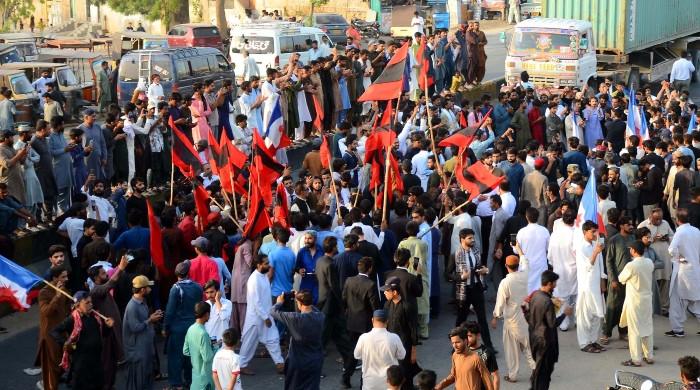Sindh Lawyers End Sit-Ins After CCI Rejects Canal Project
SUKKUR: Following the Council of Common Interests’ (CCI) rejection of the proposed new canals initiative on the Indus River, attorneys in Sindh declared on Tuesday that all sit-ins would cease, with the exception of the one at Baberlo Bypass in Khairpur.
Celebrations erupted at Baberlo bypass—the site of a 12-day sit-in—upon receiving the news that the federal government’s canal construction plan had been reversed. Demonstrators voiced their happiness, hailing it as a triumph for Sindh’s solidarity and strength.
The All Sindh Lawyers Action Committee declared that all other sit-ins throughout the province would be suspended, and court boycotts would formally conclude starting April 30. The Baberlo Bypass sit-in, however, will continue for the time being as further demands remain unresolved.
Lawyer Sarfraz Metlo stated that the action committee would confer with Sindh government officials in Sukkur today to push for demands such as the elimination of corporate farming, the dismissal of charges against protesting lawyers, and the recovery of confiscated vehicles.
Metlo added that the decision to end the Baberlo sit-in would be made following the outcome of this meeting.
Meanwhile, Karachi Bar President Aamir Nawaz Warraich stated that while the Baberlo Bypass sit-in is ongoing, traffic is no longer being affected. He further stated that now that the building of new canals has been halted, the corporate farming projects must also be cancelled.
Despite the ruling, over 40,000 vehicles remain stuck at different locations due to prior blockades, severely impeding the movement of commodities and essential goods between Sindh and Punjab.
According to Traffic Police, the demonstration on the Link Road connecting the National Highway to the Super Highway in Karachi, headed by lawyers and political activists, has also ended, allowing traffic to return to normal.
The protest, which was carried out by lawyers and politicians, had been going on for several days, causing significant traffic congestion.
Similarly, lawyer sit-ins in Kandhkot, Ghotki, and other locations have ended, restoring mobility across the province.
The CCI, presided over by Prime Minister Shehbaz Sharif, convened the day before and rejected the federal government’s proposal to construct new canals from the Indus River. The council also reversed the Executive Committee of the National Economic Council’s (ECNEC) approval, which was given on February 7.
The federal government has pledged to collaborate with all provincial governments to achieve long-term consensus on agricultural and water management policies.
The CCI also decided to return IRSA’s January water availability certificate and seek wider engagement with all relevant parties.
A new committee comprised of representatives from both the federal and provincial governments will be established to propose solutions within the framework of the Water Apportionment Accord of 1991 and the Water Policy of 2018.
The canal project, a component of the Green Pakistan Initiative, sparked weeks of demonstrations across Sindh when worries arose that it would jeopardise the province’s historical water rights under the 1991 Accord.
Political and nationalist parties, civil society groups, and lawyers joined forces to stage massive demonstrations and sit-ins at key locations, disrupting traffic on major highways.
Despite previous assurances from the prime minister that no project would proceed without consensus, the protests continued until the CCI made its formal decision.
The estimated cost of the abandoned Cholistan canals project was Rs211.4 billion, and it was intended to bring thousands of acres of barren land under cultivation in Punjab’s Cholistan desert.



Comments (0)
No comments yet. Be the first to comment!
Leave a Comment